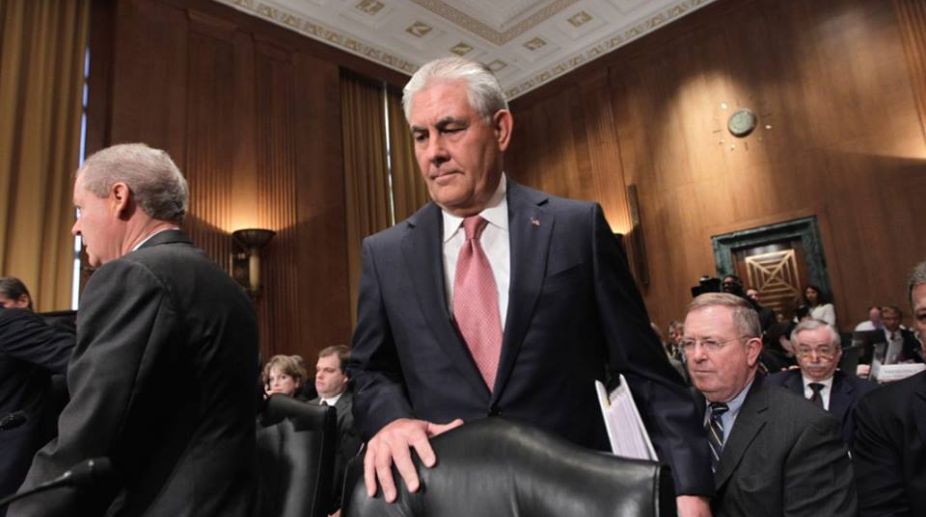Netflix CEO Ted Sarandos’ pay package dipped in 2023, but still it was $49.8 mn
Netflix co-CEO Ted Sarandos earned a bit less in 2023 than the year before -- but his pay package was still worth $49.8 million, reports 'Variety'.

Rex Tillerson (Photo: Facebook)
The United States has asserted that Myanmar is no longer one of the world's worst offenders on human trafficking, while removing both Myanmar and Iraq from a list of countries that use child soldiers.
In its annual report on human trafficking, the State Department yesterday also demoted China to the lowest ranking over its trafficking record, putting it in the same category as North Korea, Zimbabwe and Syria. Afghanistan and Malaysia were recognized for taking steps to curb trafficking, while Iraq was seen as making insufficient progress on that issue.
Ivanka Trump, the senior White House adviser and daughter of President Donald Trump, said ending human trafficking was in both the moral and strategic interests of the US, describing the effort as a "major foreign policy priority" for the administration:
Advertisement
"As a mother, this is much more than a policy priority," she said at a ceremony to unveil the report. "It is a clarion call into action in defense of the vulnerable and the exploited."
Secretary of State Rex Tillerson said that the roughly 20 million victims of human trafficking globally illustrate how much more work must be done.
"Regrettably, our challenge is enormous," Tillerson said.
"Human trafficking is becoming more nuanced and more difficult to identify. Much of these activities are going underground, and they're going online."
Myanmar and Iraq were also taken off the blacklist of foreign governments identified of having child soldiers, a move that Human Rights Watch said was premature in the case of Myanmar and undermines US credibility in ending the use of children in warfare. The group said the UN has documented child recruitment by Myanmar's armed forces in 2016.
Also known as Burma, Myanmar was promoted for its efforts against recruitment of child soldiers and its first prosecution of government officials under a human trafficking law. The Southeast Asia nation had been demoted to the lowest tier last year, shortly after it shifted to civilian government, ending decades of oppressive military rule.
Myanmar's elevation is a boost for Aung San Suu Kyi's administration, which is facing growing criticism from human rights groups. The political transition in the Southeast Asian country has been a bumpy one as it wrestles with ethnic conflict and deep-seated discrimination against its minority Rohingya Muslims.
"Congress should be asking tough questions about the State Department's questionable decisions to upgrade several countries with poor records on trafficking," said John Sifton of Human Rights Watch.
Indeed, some lawmakers already were. Sen. Robert Menendez, D-N.J., said the Trump administration's first report on trafficking had become a missed opportunity to show the US would hold countries accountable for what they do or don't do to stop the scourge.
"Alas, this year's report only further erodes the credibility of that ranking system," Menendez said. A hawk on Cuba policy, Menendez took particular issue with the decision not to downgrade the island to the lowest rank.
But other lawmakers praised the administration's handling of the rankings, including Sen. Bob Corker, R-Tenn., who had questioned the Obama administration's decision to upgrade several countries in recent years. The chairman of the Senate Foreign Relations Committee, Corker called this year's report "a step forward in efforts to improve the transparency and integrity of the rankings."
The demotion of China was a particular surprise this year, marking the first major, public rebuke of China's human rights record by the Trump administration, which has generally avoided direct, public criticism of Beijing and other majors on rights issues. The Trump administration has been seeking China's help to pressure North Korea to give up its nuclear program, and Tillerson said yesterday that China's failure to crack down on forced labor from North Korea was among the reasons it was downgraded.
In the report, the US said that not only was China not meeting minimum standards to stop trafficking, it also was "not making significant efforts to do so." The report also said there were indications that China's government was still complicit in forced labor, including in some drug rehabilitation centers. The US said China's efforts to prosecute traffickers had also fallen. (AP)
Advertisement